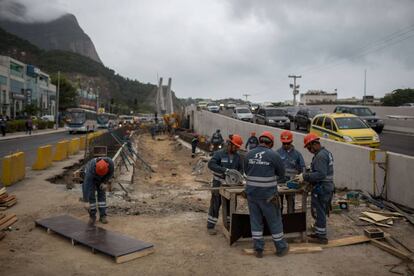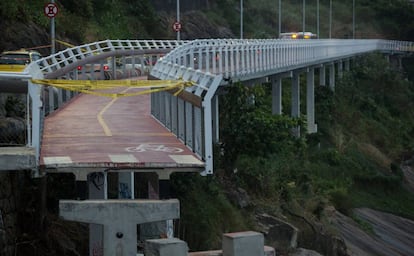Rio racing to overcome hurdles ahead of August 5 Olympic opening
Despite delays and several deaths, Brazilian authorities are confident infrastructure work will be completed in time


This Wednesday, Rio de Janeiro enters the 100-day countdown to the opening of the Olympic Games. While the Olympic torch begins its journey from Athens across the Atlantic to Brazil, the authorities in Rio are racing against time to complete work in the run up to the August 5 opening ceremony. The good news is that almost all the major infrastructure work is already completed; the bad news is that there is still a long list of problems that will likely cause many sleepless nights for the authorities there until after the closing ceremony on August 21.
Problems have included deaths at construction sites, the impact of the Zika virus, an ongoing political crisis that could bring down the government and delays to work on the metro system. At the same time, around half of tickets to events remain unsold, while the police have expressed fears that the Games could be overshadowed by demonstrations to protest the worst economic and political crisis since the country emerged from military rule in the mid-1980s.
Last week, a stretch of cycle path that spans a section of the sea front collapsed after it was hit by waves, killing at least two people and raising concerns about construction standards. Eduardo Paes, Rio’s mayor, responded by promising to punish those responsible and to review all work so far.
We are constantly checking the work. The Olympic Village, the golf course, everything is ready, it’s just small details from here on in Eduardo Paes, Rio’s mayor
A thorough revision of construction sites could cause delays, but Paes says he is confident the Games will open on time: “We are constantly checking the work. The Olympic Village, the golf course, everything is ready, it’s just small details from here on in.”
Despite the fears, Rio has surpassed expectations, and almost all work is pretty much completed. The two main worries now are the tennis and cycle installations, which have seen a 26% cost overrun. Work on the metro, which will link the downtown tourism areas with Barra de Tijuca, the outlying district where most of the events are being held, is still not finished. The project, supposedly part of the Olympic legacy, is the responsibility of the state government, which faces a budget crisis and is unable to run its hospitals or pay its employees. Nevertheless, it has said it will have trains running by July, although this will leave little time to fully test the network.
Security is another major concern: Rio already has one of the highest crime rates in Brazil, and there are fears that violence could erupt in the favelas, or shanty towns, that ring the city.
But the city’s security problems do not just come from criminals: Amnesty International has also warned of the danger Rio’s police force poses: it was responsible for killing 307 people last year, one in five of all violent deaths in the city. “Despite promises of the legacy of a safe city to celebrate the Olympic Games, homicides committed by the police have increased constantly over the last few years in Rio. A lot of people have been seriously wounded by rubber bullets, stun grenades and firearms used by the police at demonstrations,” says the human rights organization.

Guanabara Bay, where tons of sewage and industrial waste is dumped, is the location for sailing events, but will not be cleaned up. Brazil came under fire during the World Cup two years ago for delays in finishing stadiums in the 12 cities that hosted the soccer championship, some of which were completed literally days before games. Eight workers died in the process. So far, nine people have died on Olympic projects. There were no deaths on building work for the 2012 London Olympic Games. “Nothing has been done in a hurry. We are working fast, but that isn’t the reason for the deaths,” says Rio’s mayor.
Despite the problems and delays, the city’s authorities have been supported by the International Olympic Committee. But it will be the estimated one million tourists who will visit Rio between August 5 and 21 who will be the best judges of perhaps the only distraction the country can look forward to amid increasingly difficult times.
English version by Nick Lyne.
Sign up for our newsletter!
EL PAÍS English Edition is launching a weekly newsletter. Sign up today to receive a selection of our best stories in your inbox every Saturday morning. For full details about how to subscribe, click here.
Tu suscripción se está usando en otro dispositivo
¿Quieres añadir otro usuario a tu suscripción?
Si continúas leyendo en este dispositivo, no se podrá leer en el otro.
FlechaTu suscripción se está usando en otro dispositivo y solo puedes acceder a EL PAÍS desde un dispositivo a la vez.
Si quieres compartir tu cuenta, cambia tu suscripción a la modalidad Premium, así podrás añadir otro usuario. Cada uno accederá con su propia cuenta de email, lo que os permitirá personalizar vuestra experiencia en EL PAÍS.
¿Tienes una suscripción de empresa? Accede aquí para contratar más cuentas.
En el caso de no saber quién está usando tu cuenta, te recomendamos cambiar tu contraseña aquí.
Si decides continuar compartiendo tu cuenta, este mensaje se mostrará en tu dispositivo y en el de la otra persona que está usando tu cuenta de forma indefinida, afectando a tu experiencia de lectura. Puedes consultar aquí los términos y condiciones de la suscripción digital.








































